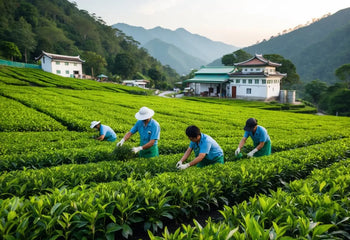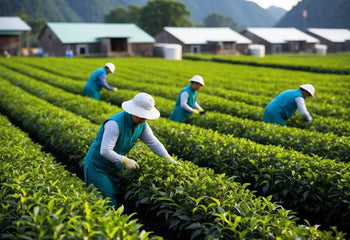What Makes Pu Erh Tea So Expensive? Breaking Down the Costs and Quality Factors
Shop our premium Pu Erh tea collection—available in both ripe and raw varieties! Pu Erh tea stands as one of the most intriguing and valuable teas in the world, often commanding prices that can shock casual tea drinkers. Walking through tea markets in Yunnan, China, you'll find aged cakes selling for hundreds or even thousands of dollars. The exceptional cost of premium Pu Erh stems from its unique aging process, limited geographic origin in Yunnan province, and the centuries-old trees from which the finest leaves are harvested. We've spent years studying what makes this fermented tea so special, and the...
The Environmental Impact of Pu Erh Tea Production: Sustainability in the Industry
Shop our premium Pu Erh tea collection—available in both ripe and raw varieties! Pu-erh tea, a beloved fermented variety from Yunnan Province, carries with it more than just complex flavors and potential health benefits - it also leaves an environmental footprint worth examining. The production of pu-erh tea faces significant sustainability challenges including deforestation of ancient tea forests, water usage concerns, and greenhouse gas emissions from processing and transportation methods. These issues have become increasingly important as global demand for this specialty tea continues to rise. We've witnessed a growing movement within the pu-erh industry toward more sustainable practices over...
How to Incorporate Pu Erh Tea into Your Daily Wellness Routine
Shop our premium Pu Erh tea collection—available in both ripe and raw varieties! Pu erh tea, with its rich history dating back centuries in Yunnan Province, China, offers more than just a pleasant drinking experience. Adding this fermented tea to your daily routine can support digestion, provide sustained energy without jitters, and deliver potent antioxidants that contribute to overall wellness. We've been incorporating this remarkable tea into our daily rituals for years and have discovered it fits seamlessly at various points throughout the day. Many tea enthusiasts overlook pu erh's versatility, relegating it to special occasions rather than everyday enjoyment....
The Cultural Rituals of Pu Erh Tea in Yunnan Province
Shop our premium Pu Erh tea collection—available in both ripe and raw varieties! In the misty mountains of Yunnan Province, Pu Erh tea represents far more than just a beverage—it embodies centuries of cultural heritage, ritualistic preparation, and community bonding. We've traveled through these verdant highlands to witness firsthand how local families have preserved tea traditions that date back to the Tang Dynasty. The elaborate ceremonies surrounding Pu Erh tea preparation in Yunnan reveal a profound respect for nature, time, and craftsmanship that transcends mere consumption. The distinctive earthy aroma of properly aged Pu Erh fills traditional tea houses where...
Recent articles






